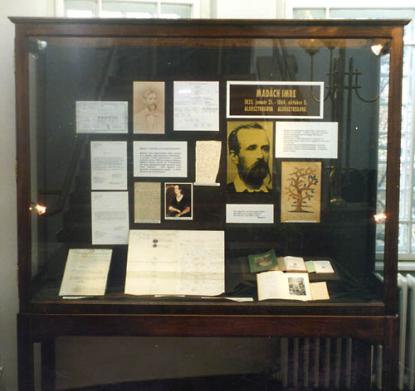2024. November 22. Friday
Palóc Museum - Balassagyarmat
|
|
Address: 2660, Balassagyarmat Palóc liget 1.
Phone number: (35) 300-168, (35) 500-133
E-mail: info@palocmuzeum.hu
Opening hours: Sat-Sun 9-16
|
Museum tickets, service costs:
|
Ticket for adults
(26-61 years of age)
|
800 HUF
|
/ capita
|
|
Ticket for students
(6-26 years of age)
|
400 HUF
|
/ capita
|
|
Group ticket for students
|
4300 HUF
|
|
|
Group ticket for students
|
5600 HUF
|
|
|
Ticket for pensioners
(62-70 years of age)
|
400 HUF
|
/ capita
|
|
Ticket for families
(2 adults + 2 children)
|
1800 HUF
|
/ family
|
|
Combined ticket for families
|
2300 HUF
|
/ family
|
|
Program ticket
|
400 HUF
|
/ capita
|
|
Guide
|
3500 HUF
|
/ group
|
|
Guide
|
4700 HUF
|
/ group
|
|
Photography
|
1200 HUF
|
|
|
Photography
|
1800 HUF
|
Madách Imre was born in January 1823 in Alsósztregova and died therein 1864. He persued his studies in Vác and Pest, then in 1840 he returned to Nógrád. He first became a notary assistant under the supervision of István Sréter, deputy lieutenant of Nógrád. As a brave regional speaker of the opposition party, he soon became known in the political life of the county. In 1844 he became a judge of the Court of Appeal, but - because of his desease - he resigned in 1848.

He married Erzsébet Fráter in 1845. In the quitness of the family manson house in Csesztve he spent six wonderful years together with his wife. After th edefeat of Hungarian Revolution he was imprisonned for his rebllious deeds. Whilst he was in prison his wife committed adultery. Madách divorced her and moved to his mother together with his children.
His main work, The tragedy of man was written in 1859-60.
The legacy seen on the exhibition was written (dictated and sight by himself) one day before his death, on 4th October 1864. The testament was left to his grandchild called Flóra Madách, whos daughter - living in Brasil - gifted the highly valued writing to the Palóc Museum.

He married Erzsébet Fráter in 1845. In the quitness of the family manson house in Csesztve he spent six wonderful years together with his wife. After th edefeat of Hungarian Revolution he was imprisonned for his rebllious deeds. Whilst he was in prison his wife committed adultery. Madách divorced her and moved to his mother together with his children.
His main work, The tragedy of man was written in 1859-60.
The legacy seen on the exhibition was written (dictated and sight by himself) one day before his death, on 4th October 1864. The testament was left to his grandchild called Flóra Madách, whos daughter - living in Brasil - gifted the highly valued writing to the Palóc Museum.
